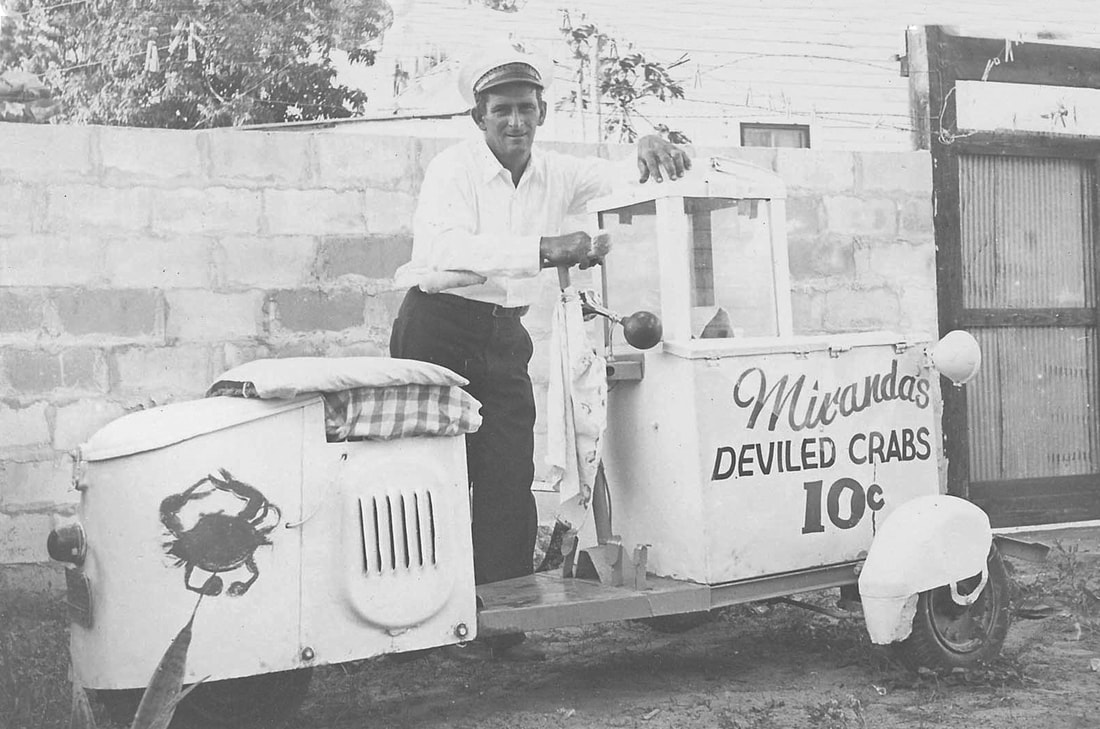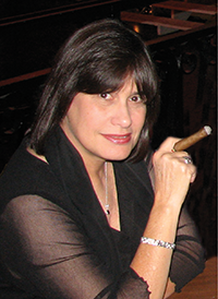|
On any given day, you could find him riding his small scooter up and down the streets of Ybor City. You could not resist his deviled crabs–they were the best! He was a fixture in Ybor City for many years and has become a legend to those lucky enough to have eaten one of his deviled crabs. His name was Francisco Oscar Miranda, but he was known to us as the Deviled Crab Man. Once you saw him, your challenge was getting in line as quickly as possible to make your purchase before he sold out! After you paid 10 cents, he would ask, "Con picante–sin picante" (With hot sauce or without)? I liked mine with lots of hot sauce. Each crab roll was wrapped in wax paper and twisted at both ends. He used the mouth of the bottle of hot sauce as a tool to open the paper and separate the warm breading. The savory crab filling was revealed as he shook the bottle to apply a generous amount. I have often thought about those deviled crabs, and I'm not the only one. On a recent visit to El Gallo de Oro Restaurant in West Tampa, I was having coffee with some of the old timers as they began to talk about Miranda deviled crabs and how good they were–some even remembered when they cost just 5 cents! When I commented that those deviled crabs would make a good story, someone mentioned that the Deviled Crab Man's son Jorge still lived in Tampa. A telephone book appeared at the table, and a search was on for his number. It didn't take long to find a listing for Jorge Miranda. My friend Eddie Contreras dialed the number on his cell phone and handed it over to me. The phone rang and was answered by a recording. I quickly sputtered the message, "If you are the son of the Deviled Crab Man, will you call me at the following number?" All my buddies at the table smiled, knowing their mission was accomplished as they returned to drinking coffee and talking this Saturday morning. A few days later, to my surprise, he called. He said his father was Francisco Oscar Miranda and was known as the Deviled Crab Man. I asked if we could set up a time to talk, and we agreed on a date to meet the following week. When the day arrived, Jorge and his wife invited me into their home. We sat at their dining room table, and I eagerly asked him questions. Cuban coffee sustained us for the next hour and a half while Jorge shared memories of his father and mother and their deviled crab business. Francisco was born in Tampa on October 23, 1903, to Francisco Miranda (born in Spain) and Rita LeMeren (born in France). They arrived in this country in the late 1800s and settled in Ybor City. When Francisco was a year old, his family moved to Cuba, and he returned to Tampa when he was 20. This was when he first began to make and sell deviled crabs with the help of his wife, Luisa Herrero. Francisco was an excellent cook and thought he could make steady money selling deviled crabs. Luisa worked at Perfecto Garcia Cigar Factory for a while but eventually quit to help her husband full-time. Each day, he purchased 16 to 19 dozen live crabs from a local fisherman who was also named Miranda (no relation). The crabs came in large burlap sacks and were quickly cooked in boiling water. They were allowed to cool, and then Francisco and Luisa would begin the tedious task of cleaning and separating the meat from the shell. Jorge and his two brothers, Oscar and Louis, and their sister Margaret were expected to help each day when they arrived home from school. Sometimes, Jorge's Aunt Lucy Ayala also provided an extra hand. Large sacks of green peppers, onions, and gallons of tomato sauce were purchased. A sofrito of the peppers and onions cooked in large pots, and then the tomato sauce and other spices were added. The sauce was cooked for hours to give the flavors time to marry. The next step was to prepare day-old Cuban bread purchased from La Segunda Central bakery in Ybor City for use as breading. The hard-crusted bread was crumbled into large trays filled halfway with water. The bread and water were mixed until a mush was formed. Flour and baking soda were sprinkled in to make a sticky breading. The Cuban breadcrumbs gave the deviled crab a thin coating, so when you bit into the crab roll, you tasted crab–not breading as you do with many of today's deviled crabs. Jorge said his mother and father worked very hard, usually from 4:30 in the morning until 11 P.M. After preparing the deviled crabs, his father would load up and travel from his home on 18th Avenue near Cuscaden Park and the Perfecto Garcia Cigar Factory to various points around Ybor City's 7th Avenue, including an 11 A.M. and 530p.m. trip to Tampa's shipyard. The deviled crabs were kept inside a sealed box on top of his scooter. They were placed on a metal tray and warmed underneath by a can of lighted sterno. Once all the crabs were sold, he returned home and loaded up again. Jorge spoke highly of his father and mother and said they did what they had to do to support their family. The money made from selling the deviled crabs gave Jorge and his brothers and sister a good education. His sister Margaret completed business school; his brother Louis graduated from George Washington University, became a dental technician, and later worked for the post office. Oscar graduated from the University of Florida and became a radio and television engineer who worked for WFLA. Jorge worked for the post office like his brother Louis and retired after 39 years of service. All this was paid for with the money his father and mother made selling deviled crabs. Pride and appreciation were evident in his voice as he spoke of his hardworking parents. Francisco Oscar Miranda continued making deviled crabs until the last six months of his life when his health deteriorated. He passed away on December 26, 1953, at 50, and his wife, Luisa, died on February 20, 1972, at age 64. It says something that after fifty-four years, people still talk about Miranda's deviled crabs, how good they were, and how they wish the Deviled Crab Man were still around. Sadly, those deviled crabs have faded into history just like Goody-Goody hamburgers and root beer served in frozen mugs at the A&W. For those of us lucky enough to have eaten those deviled crabs, we are spoiled and have joined the ranks of many searching for a deviled crab that can compare with those of the Deviled Crab Man. CIGAR CITY MAGAZINE- MARCH/APRIL 2007 Art & Photography Contributors: Hillsborough County Public Library, Tampa Bay History Center, The Florida State Archives, The Tampa Tribune/Tampa Bay Times, University of South Florida Department of Special Collections, Ybor City Museum Society, private collections and/or writer. MARILYN L. FIGUEREDOMarilyn was Cigar City Magazine's co-owner and managing editor until her passing in 2007. Marilyn was born in 1948 in Tampa, where she lived her entire life and, more specifically, her early childhood in Ybor City. After a successful 30-year career at Delta Air Lines, Marilyn embarked on what became her true passion: reinvigorating the colorful, multicultural history of Ybor City through the lives and personal stories of the families and individuals who made up the uniqueness of this Tampa quarter. She did this primarily through Cigar City Magazine, serving on various committees and organizations, and attending cultural events throughout Tampa. Her work alongside her niece Lisa Figueredo, founder and Publisher, was instrumental in producing Cigar City Magazine. Marilyn's legacy will live forever throughout the pages of Tampa's first historical magazine–CigarCityMagazine FOLLOW CIGAR CITY MAGAZINE
0 Comments
Your comment will be posted after it is approved.
Leave a Reply. |
Archives
June 2013
Categories
All
|
Cigar City is a Florida trademark and cannot be used without the written permission of its owner. Please contact [email protected]
© 2021 Cigar City Magazine. ALL RIGHTS RESERVED.
© 2021 Cigar City Magazine. ALL RIGHTS RESERVED.



 RSS Feed
RSS Feed